Dec. 7, 2015: I’ve decided to freecycle the book I bought as my holiday gift to readers, so add your own “gift of failure” in the comments section (or tweet @ShapingYouth) for a chance to win it!
Dec. 6, 2015 It’s affordable, though hard to wrap, since it shape-shifts at different ages and stages.
It’s elusive, with many parents not quite ready to invest in short term expenditures that yield long term gain.
And it’s proving to be even more valuable over time, with outcomes and measures far beyond social currency, emotional learning and resilience.
The Gift of Failure is the present no one wants to give, but the package that can ultimately surprise and enhance the wellness of us all.
Jessica Lahey’s The Gift of Failure is a book about the merits of autonomy, competence and connection which serve as a strong shoulder shake to parents who “put the cape on” like overzealous comic crusaders swooping in to ensure success.
“Learned helplessness” becomes like kryptonite for kids growth, resourcefulness, and innovation.
In adolescence, it can create a hollow core of empty, vapid values and churn and burn apathy for rote achievement that health science professionals and educators are only just now starting to name, blame, and even fully understand in terms of the larger public health sphere where the World Health Organization cites depression as the leading health concern among ages 10-19. (WHO adolescent health report) Slate even ran “Kids of Helicopter Parents are Sputtering Out” correlating college depression and citing a slew of eyebrow-raising epithets naming students as “existentially impotent” and “excellent sheep.” Ouch.
Caught early on, The Gift of Failure could preclude this systemic problem hampering visionary thinking in our own adult workplace environments too. Many of us have experienced bright, even brilliant colleagues who have the skills to solve BIG issues scaled with solutionary global impact but don’t even consider tasks out of their proven comfort zone if risk of failure or their own ‘branded persona’ isn’t backed by a guaranteed ‘win.’
That’s a loss for us all.
 Mind you, over-parenting, over-achievers and robo-students are a heavily tread topic whether it’s seeing high school students sprint to the finish line to get into a coveted college or college students ‘Doing School’ in pursuit of a degree purported to be the next trophy stepping stone in life.
Mind you, over-parenting, over-achievers and robo-students are a heavily tread topic whether it’s seeing high school students sprint to the finish line to get into a coveted college or college students ‘Doing School’ in pursuit of a degree purported to be the next trophy stepping stone in life.
I’d already attended a “Twitter chat” about The Gift of Failure, as the ‘price of privilege’ and perfectionist prevalence is problematic, with kids sinking into the quagmire of not even trying for fear of making a mistake, whether in sports, student politics, or resolving relationship dust-ups and social media resilience.
That said, I noticed there’s also a HUGE socioeconomic divide in these dynamics.
When I attended The Gift of Failure book tour through the SF Bay area’s popular Common Ground Speaker series, I scanned the audience noting “affluenza and white privilege” out the wazoo which helped add context for me, given that many of the kids I’ve encountered in Title One schools have a whole different set of issues than hovering helicopter parents who do everything for them, leaving kids frozen in self-doubt with a thwarted sense of risk taking and quelled love of learning…As the kids themselves might say, “first world problem.”
The resilience of overcoming obstacles and ACES (adverse childhood experiences) may even be helpful to ‘flip the script’ and sort out some lessons about framing what ‘success’ means for us all.
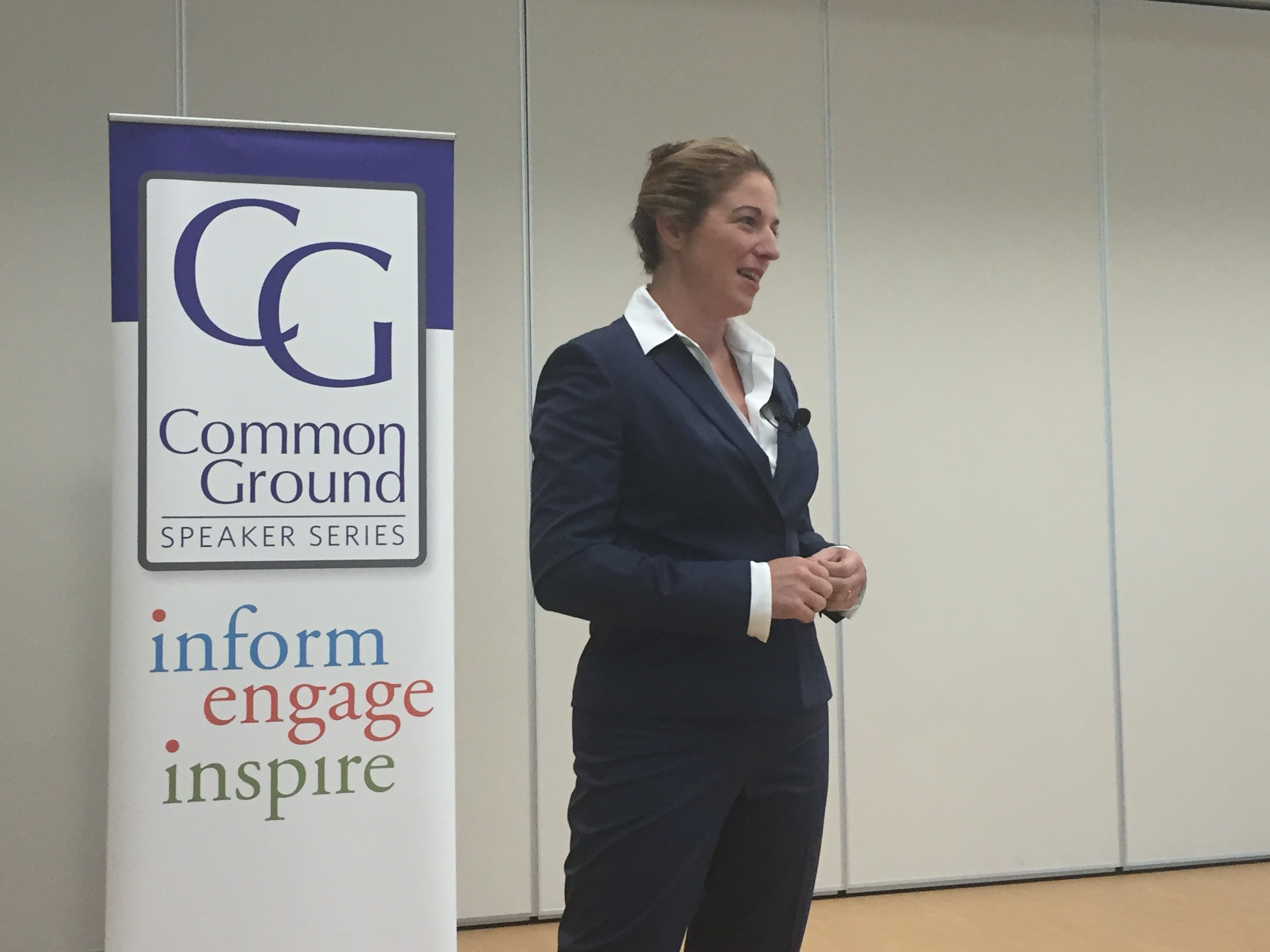 Masterful first-person storytelling is an art form, and Jessica Lahey had me at hello, sharing tales from the teaching trenches with open-hearted humor and universal touchpoints that made each instance relatable.
Masterful first-person storytelling is an art form, and Jessica Lahey had me at hello, sharing tales from the teaching trenches with open-hearted humor and universal touchpoints that made each instance relatable.
She shared tidbits of personal poignancy like the fact that her OWN son, age nine at the time, was clunking around the schoolyard in knee high wader boots instead of sneakers, simply because in the rush to get out the door in the morning he never HAD to learn to tie his shoes and the only ones in the mud room had laces. He’d made the choice to hinder his own play time, oddly plunking around “as if his legs were in a cast” instead of admitting he didn’t know how to tie his shoes, too embarrassed to learn a missed skill now at age nine.
How often do parents reach for handy velcro grab-n-go solutions without slowing down long enough to let the child figure it out? The question goes far beyond shoes…and the squirm-worthy vibe in that room was palpable. She seeded the concept of introspection right then and there on the spot and you could almost hear the cognitive wheels turning as parents winced pensively trying to tap into instances where ‘oops’ moments might apply…
She gave us all a mandate for mindfulness implying ALL parents need to reassess, back the heck off and let both the tiny and vast struggles fall into a pile of teachable moments, come what may…Whether it’s a ‘do over’ for crusted on food plopped into the dishwasher at Thanksgiving or curbing the control freak factor of pre-judging ‘scary’ looking adolescent peers testing new turf on the homefront.
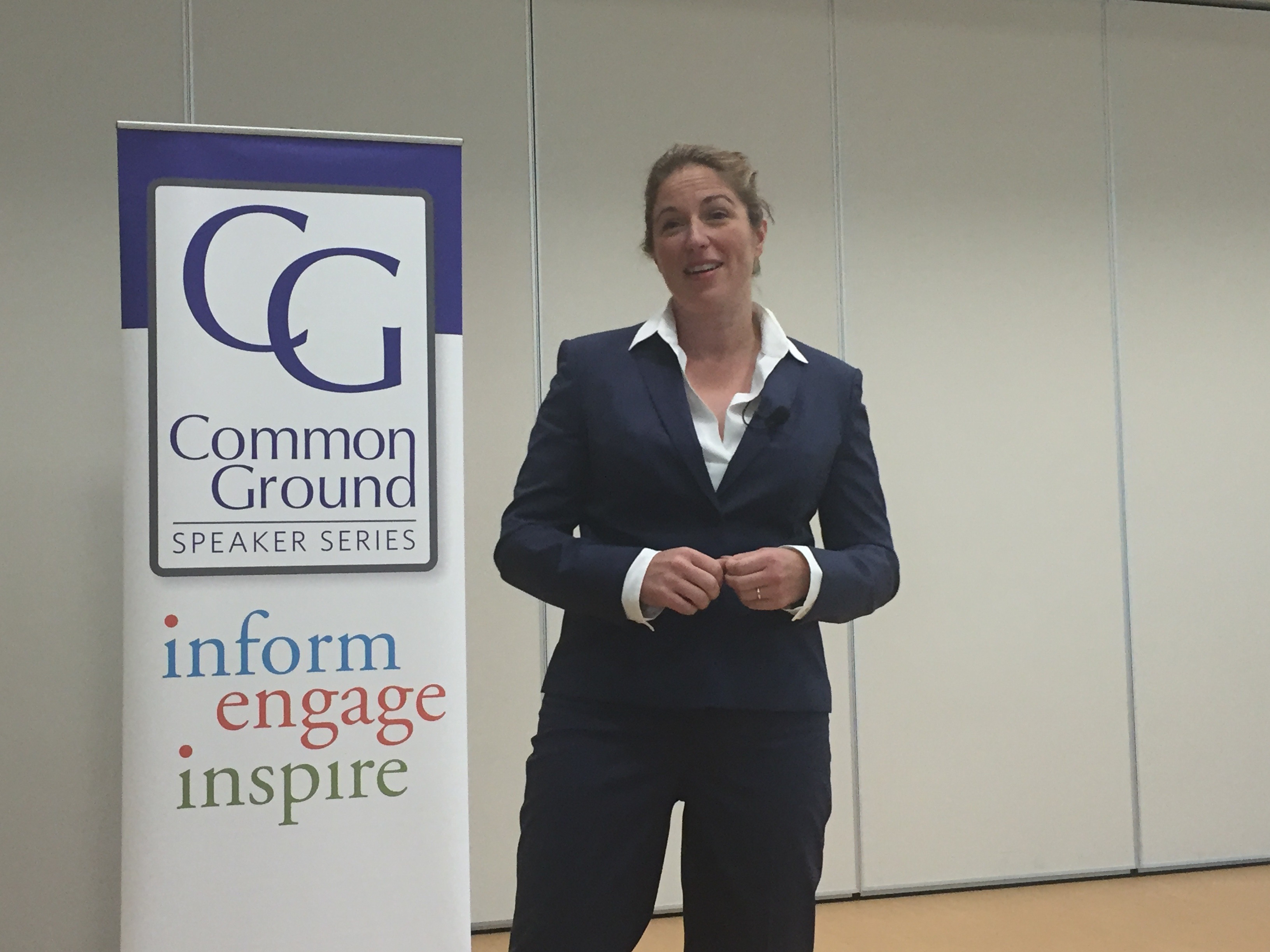 Her storytelling with everyday teaching anecdotes plucked from the school day reminds us these are not ‘reality TV’ simulated lives…
Her storytelling with everyday teaching anecdotes plucked from the school day reminds us these are not ‘reality TV’ simulated lives…
Her student’s take on Shakespeare soliloquies was hilariously distilled into “I get it, he’s giving his dad the finger” and her depiction of the bolt upright tension and sad stresses of students who have had the love of learning bled out of them in favor of the almighty “A”…was conversely, downright heart-wrenching.
At one point, audible gasps came from the audience, as she revealed a parent/teacher conference recap in excruciating detail, with the PARENT, not the student having plagiarized a paper from the web earning a zero!
Admittedly, I was smack dab amidst an incredulous, “say whaaaa?” reaction when I looked around the audience and saw heads bobbing as if they could relate, as the murmurs of empathetic moms mirrored a “hands to the face emoji” media moment. “Wait, what am I missing,” I thought to myself, “Is this even a ‘thing?’
As the audience listened, rapt with attention, I targeted who I’d interview about this after the session based on facial expressions. Jessica Lahey revealed the conference conversation slowly, piece by piece…the student had been struggling with an eating disorder, mega mental health adversity and various distractions and the fiercely protective parent who ‘put the cape on’ was simply trying to rescue the child from failure on top of all the drama.
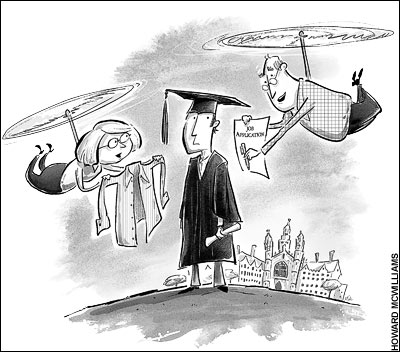 Multiple sub-conversations and side chatter filled the room in ‘been there, done that’ type of exchanges.
Multiple sub-conversations and side chatter filled the room in ‘been there, done that’ type of exchanges.
I got my ‘aha’ moment with that tidbit quickly, as I guess the “success at all costs” dynamic takes on a different tenor and style unique to each demographic …I just hadn’t been exposed to this one.
Clearly, helicopter hovering can chop through important developmental stages and fear of failure can deplete process in favor of ‘product’…but I sure hadn’t heard that level of ‘do it yourself’ parenting. Wow. Mind you, this whole “invasive parenting” bit is not a new zeitgeist. The hothouse moniker of smothered ‘mini-me’ dynamics and tots as trophies has been bouncing around the echo chambers of the media world for well over a decade.
In 2008 Psychology Today’s editor Hara Estroff Marano wrote “A Nation of Wimps: The High Cost of Invasive Parenting” gleaning headlines in Time and The New Yorker about the neuroscience of brain plasticity being harmed with atrophy from parents doing too much for kids. That particular article always resonated in its “matter of fact” scientific approach:
“Dendrites sprout. Synapses form.” If, on the other hand, children are protected from such trial-and-error learning, their nervous systems “literally shrink.” As children explore their environment by themselves—making decisions, taking chances, coping with any attendant anxiety or frustration—their neurological equipment becomes increasingly sophisticated” Marano says.
Again, this is not new. We’ve all heard about the ‘everyone gets a trophy’ praise-heaping problem of building self-esteem only to have it go awry with bogus reward systems (cue Po Bronson/Ashley Merryman’s Nurture Shock) Then there was the Amy Chua ‘Tiger mom’ media blitz about the pressures placed on achievement and competition to get ahead…and now it’s about the fear of failure and over-involved parents perpetually feeling they’re not ‘enough,’ subjected to microscopic judgment, jumping in to help only to render offspring stressed and stupefied…or worse yet, ‘neurotic’ as this LiveScience article purports.
So why has it taken almost a decade to learn from these seemingly obvious life lessons, as we fast forward to read study after study sounding off about how “Coddled Kids Crumble” and why intrinsic vs extrinsic rewards are necessary to create a healthy love of learning, exploration and life balance superseding any ‘achievement’ markers, hoop jumping test scores, and altered states of ‘success’ as students make their way through the real world to be well adjusted adults.
Seems sweeping generalizations still get pinned on parents with new data pointing to how we’re failing kids with the societal trend tracking du jour, when many of us would like to check the ‘none of the above’ box. Granted, these books and trends are important, informative, and worthy of deep diving to prevent fouling up the works of childhood when certain behaviors and cause/effect attitudes are clearly preventable, but they also seem to ebb and flow in media waves…
You can almost set your clock to the predictable parenting punditry and pendulum swings just like butter vs margarine and other health care debates. (parents are under involved, then over involved; parents don’t ‘get’ digital devices, then parents are absent with over use, etc.) Clearly we’re in for another ‘market correction,’ and media is already ‘on it’ as you can see by recent headlines on fear of failure and how it’s fouling up the works:
PBS Expert Tips/Advice: Teaching Kids Its Okay to Fail
What Do Students Lose by Being Perfect? Valuable Failure
Mom, I Know You’re Doing That Gift of Failure Thing, But Could You Please Just NOT?
The same morning Jess Lahey was speaking in macro about The Gift of Failure and the need for self-inspired challenges, Curse of the Good Girl author Rachel Simmons was on Good Morning America taking a micro lens specifically to Why Failure Hits Girls So Hard detailing the ‘disease to please’ dynamics. (about 8:21 here click each minute forward to view GMA videos, Oct 14, 2015)
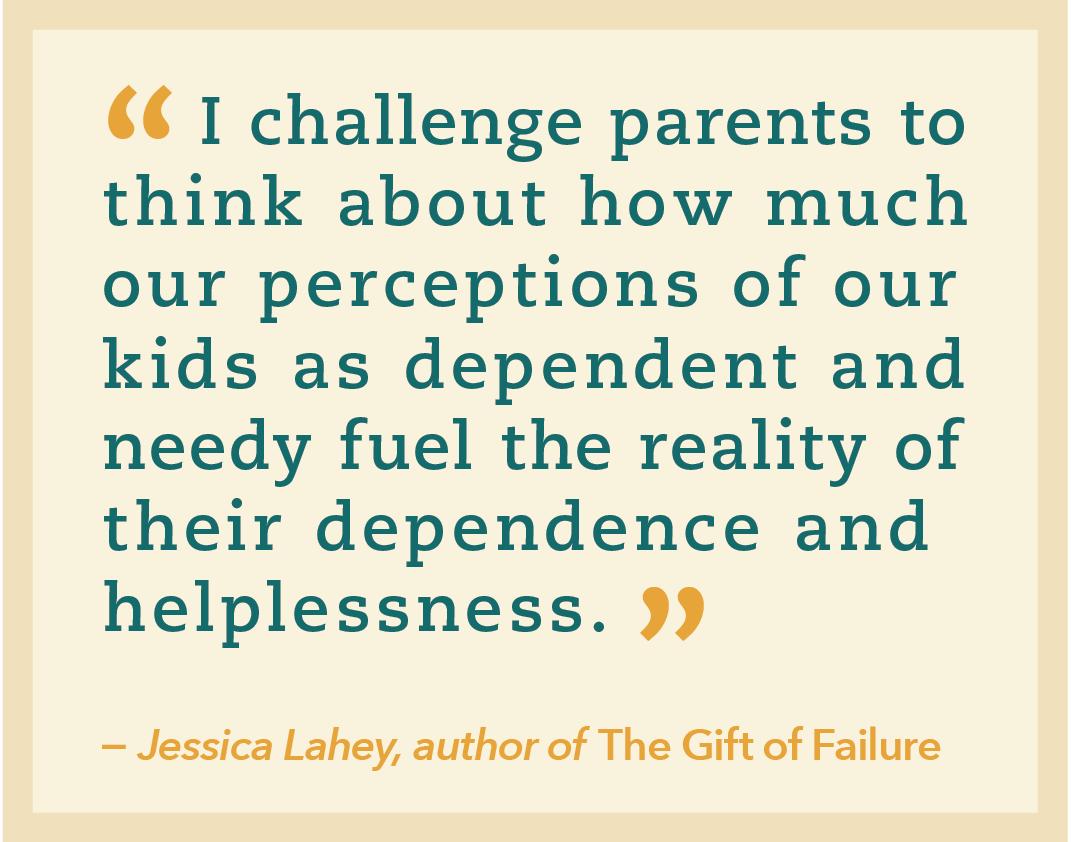 The whole odd premise that’s there’s one avenue to success and all else is failure has setback students markedly and set them up for not just failure but wretched unhappiness.
The whole odd premise that’s there’s one avenue to success and all else is failure has setback students markedly and set them up for not just failure but wretched unhappiness.
Lahey purports that self-advocacy is more important than college, fighting one’s own battles is a massive life skill, and teachable moments are the very fabric of our identities as we slog through the process of figuring out who we are and where we fit in on this big blue marble of a planet.
While The Gift of Failure focuses primarily on the educational and parenting studies of why failure matters, I’d add the whole concept of intrinsic purpose vs extrinsic rewards and growth over fixed mindsets and behaviors raises the bar for humanity overall…not just developing little human beings.
Her subtitle, “How the Best Parents Learn to Let Go So Their Children Can Succeed” easily applies to “letting go in order to learn anew” at every age and stage, whether it’s referencing career changes, life pivots, entrepreneurial ventures, marriage, or even Silicon Valley’s risk-based cultural credo of failure that many wear like a badge of honor.
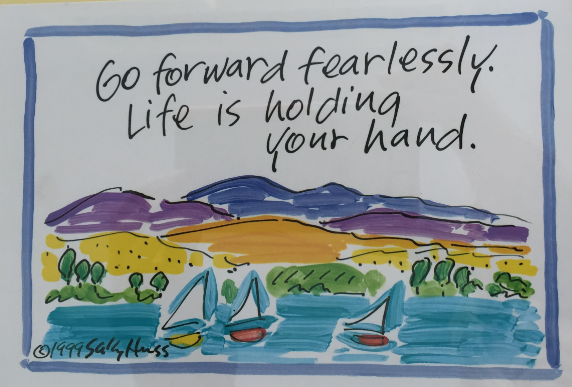 Whether at four or forty-four, The Gift of Failure is an enviable life skill, but not an ‘inevitable’ one, so “Teach your children well.” It takes practice to be bold in a fear-ridden culture.
Whether at four or forty-four, The Gift of Failure is an enviable life skill, but not an ‘inevitable’ one, so “Teach your children well.” It takes practice to be bold in a fear-ridden culture.
Though supportive, the default parenting phrase in my own household as a child was “Figure it Out!”
Maybe that’s generational. And maybe that’s why I’m staring at a sign on my desk for my next life chapter that says: “Go forward fearlessly. Life is holding your hand.” I’m ready to grab happiness by the lapels. You?
Visual Credits: Featured slider photo from this Gift of Failure article by Kathleen Murray, Helicopter parenting cartoon by Howard McWilliams (also, interesting historical context)








I’ll start with one of my ‘epic fails’ as a child that taught me resilience/resourcefulness. (My parents still talk about this one)
I accidentally locked myself out when cold wind blew the door shut in the winter back east (my parents finally gifted me autonomy to be ‘home alone’ and we’d just moved in/middle school age 11) I could literally SEE the housekeys on the entrance table as I peeked through the mail slot of the front door but couldn’t get to them…soooooo frustrating! (This was pre-cellphone, knew no one, no neighbors home after school/working community, and freezing outside)
Ended up breaking off a long, thin, 6′ branch, pulled off the leaves so it was slick like a broomstick and guided it through the mailslot; looped the keyring through the stick, angled it skyward so it would slide down into my hands and voila…access. From then on “you got this” confidence permeated with a MacGyver-esque think out of the box approach to adversity that has served me well…thankful for that fail.